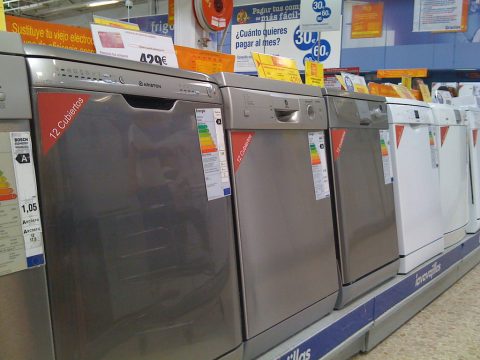Tal Bachman recounts a miserable — but increasingly common — experience with modern “energy efficient” home appliances:

“A-rated energy appliances” by Tom Raftery is licensed under CC BY-NC-SA 2.0
The LG 5.8 cubic foot Capacity Top Load Washer sat in the laundry room, brand new. Maybe it was my imagination, but it looked insouciant.
Dad said it was the latest and greatest in laundering technology. Supposedly, some sort of internal sensor system (having something to do with a computer) fine-tuned water levels depending on clothing weight. Or something. I can’t remember exactly what he — or was it the moving guy? — said.
I did notice the washing machine had several preset wash cycles — Allergiene, Sanitary, Bright Whites, Towels, Heavy Duty, Bedding, and more. You could select them with a shiny, space-age-looking chrome dial. (I would later discover the machine had other fancy features with names like TurboWash™ 360, ENERGY STAR® Qualified, Smart Diagnosis™, and ThinQ™ Technology [Wi-Fi Enabled]).
[…]
Well, it was win-win-win, with a minor caveat. The caveat was the washing machine. Turns out that for all its razzle-dazzle features, it didn’t actually clean clothes. Even worse, it took hours to not clean clothes. The “Allergiene” cycle, for example, took almost four hours. Yet when you pulled your clothes out, you could still make out the orange juice or tomato sauce stains. I’d never encountered a more useless washing machine.
“How you feeling about this new washing machine?”, I asked Dad, a few days after the hunkering down began.
“Great!”, said Dad.Okay, I thought. That’s not unusual. Music — as opposed to the mundane or practical — occupies most of Dad’s awareness, and always has. Besides, most of his clothes are black, and he probably hasn’t noticed it’s not removing the ketchup stains. Maybe he will in a few weeks.
And maybe in the meantime, I thought, I could figure out a way to reprogram the machine for cycles which actually washed. And were faster.
But no. That turned out to be way too much to hope for. The machine allowed no independent control over water volume, cycle time, or water temperatures. It only allowed selection of a preset computerized cycle — none of which got your clothes clean.
[…]
Yet more irritating was the reason it skimped on water and power: it was trying to stop global warming. Oops — I mean “climate change”. It was “environmentally friendly”. Except it wasn’t, because you usually had to run at least two cycles to get your clothes clean. That’s right: you had to use the same amount of water in the end anyway, and double the electricity.
And so — not for the first time — I had stumbled upon yet another example of technological “progress” which exacerbated the very (pseudo) problem it purported to solve. The new useless LG “Save the World!” piece of garbage was the home equivalent of Hollywood stars taking private jets to a carbon reduction conference in Switzerland.
[…]
The US Department of Energy, I discovered, had begun imposing energy efficiency regulations in the early 1990s. A decade later, they made the regulations even stricter (see here also). Then, as the years passed, they made them even stricter. And then stricter. And then stricter. All the while, the feds offered appliance manufacturers huge tax incentives — i.e., huge cash rewards — to accelerate their phase out of functional washing machines.
Government succeeded. Today, minus the loophole-exploiting Speed-King (which the feds will probably crush soon), you cannot find a new washing machine — front- or top-loading — which washes clothes anywhere near as well as its predecessors. The rationale for this — saving the world from global warming — doesn’t even rise to the level of ludicrous. Just for starters, as I type this, we’re enduring one of the coldest winters ever recorded. New Hampshire’s Mount Washington Observatory just recorded a wind chill calculation of minus 109 degrees Farenheit, an all-time record for the United States (and approaching midway between the average temperatures of Jupiter and Mars). Temperatures are thirty degrees Farenheit colder than average in many places. Why would anyone want to bring temperatures down even further? And at the cost of destroying washing machine functionality? And what loon could actually believe home washing machines change the climate?
In any case, thanks to an essentially totalitarian government run by bought-and-paid-for liars, control freaks, and imbeciles, we have gone technologically backward — certainly in the appliance domain, but in others — for no good reason at all. (Regulations have also downgraded dishwashers, toilets, showers, and other appliances, but we can discuss those another time)
Back in 2019, Sarah Hoyt expressed her frustrations with “modern” “energy-efficient” appliances which matched our experiences exactly.



